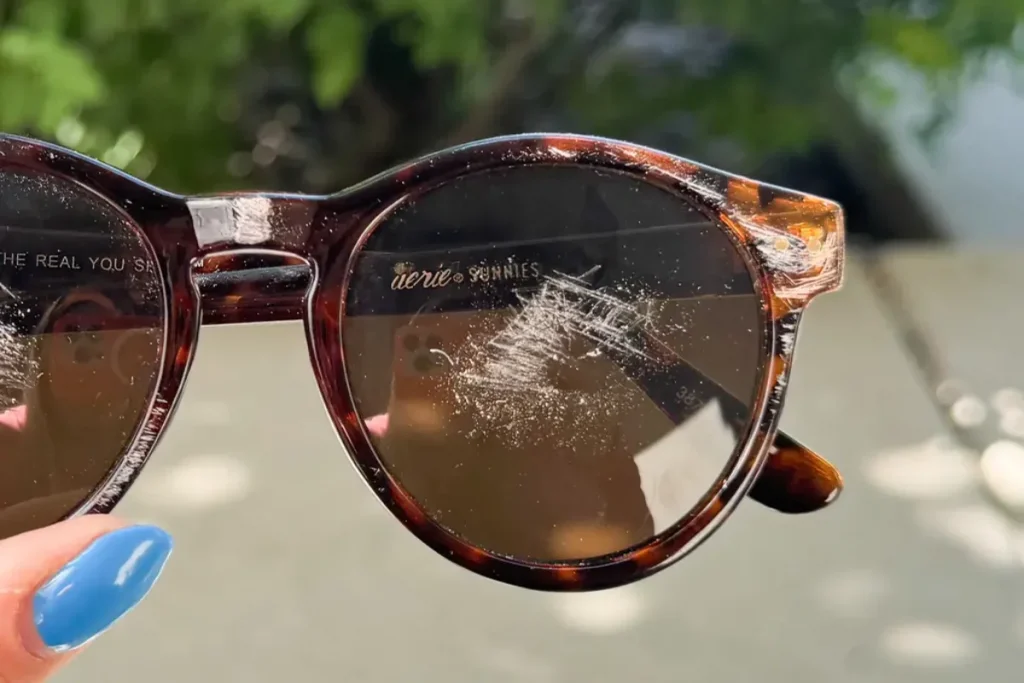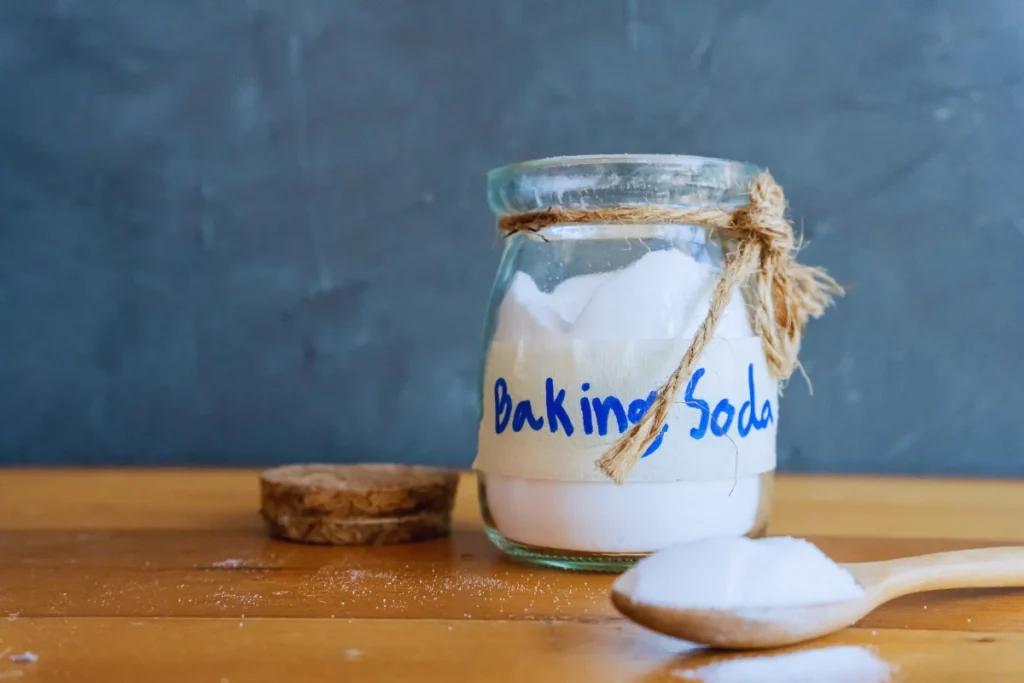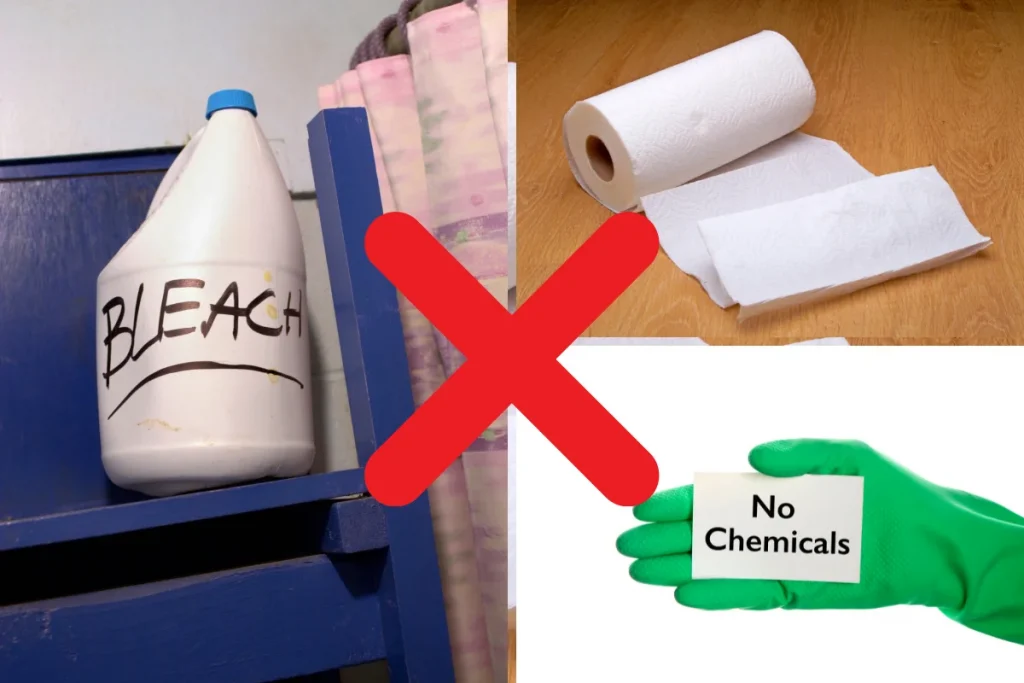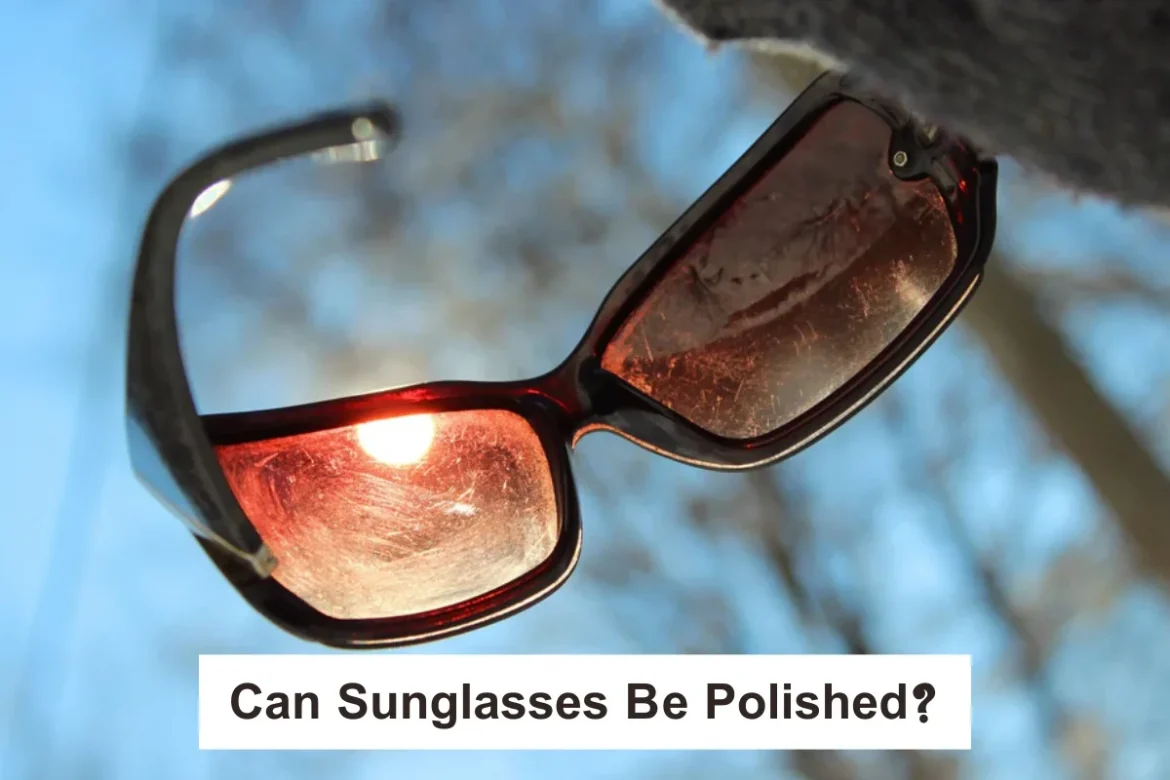Over time, sunglasses can lose their clarity and shine. Whether it’s tiny scratches from everyday use, cloudy spots from sunscreen or saltwater, or stubborn smudges that won’t go away, many people start wondering if their sunglasses can be polished to look new again.
Proper maintenance isn’t just about keeping them looking good. Clean, clear lenses improve your visibility, reduce eye strain, and extend the life of your sunglasses. Especially if you’ve invested in a quality pair, it’s worth taking care of them the right way.
This leads to a common question: Can sunglasses be polished?
Yes, sunglasses can be polished, but only if done correctly and with the right materials. Many people search for simple ways to fix scratched, cloudy, or dull sunglasses at home, hoping to restore their clarity without buying a new pair.
In this guide, you’ll learn when polishing is safe, which methods actually work, and what can damage your lenses. We’ll cover how to remove light scratches, which home remedies to avoid, and when it’s better to get professional help. If your sunglasses look worn or hazy, this article will help you bring them back to life without making the damage worse.
Understanding Sunglass Lens Materials
Before you try to polish your sunglasses, it’s important to know what the lenses are made of. Most sunglasses use one of three materials: polycarbonate, CR-39 plastic, or glass.
Polycarbonate is lightweight and impact-resistant, but it scratches easily. CR-39 is a common plastic that offers decent optical clarity and scratch resistance. Glass provides the clearest vision and best scratch resistance, but it’s heavier and more prone to breaking.
Many sunglasses also have special coatings, such as anti-reflective layers, UV protection, polarization, or mirrored finishes. These coatings are often delicate and can be damaged if polished incorrectly.
Polishing methods vary depending on the material and coating. What works for plain plastic might ruin a mirrored or polarized lens. Using the wrong technique can strip off coatings, make scratches worse, or permanently damage the surface.
Can You Really Polish Sunglasses?
Polishing sunglasses usually means trying to remove fine scratches, restore clarity, or clean off built-up film or haze.
It’s different from basic cleaning, which only removes dirt, smudges, and oils. Polishing goes a step further by slightly buffing the surface to improve how the lenses look and perform.

That said, not all sunglasses can be safely polished. Light surface scratches on plastic lenses might be reduced using gentle methods, but deep scratches, cracks, or damaged coatings cannot be fixed with polishing. Attempting to polish polarized or mirrored lenses, for example, can strip off their special layers and make the damage worse.
Also, many sunglass brands advise against polishing lenses, especially using abrasive materials or home remedies. Doing so can void your warranty or cause permanent damage.
If your sunglasses were expensive or have prescription lenses, it’s best to check with the manufacturer or retailer before trying any DIY fixes.
In short, yes, sunglasses can be polished but only under the right conditions and with care. If the scratches are too deep or the coating is damaged, replacement might be a better option than polishing.
Safe Methods for Polishing Sunglasses at Home
If your sunglasses have minor scratches or look dull, there are a few safe ways to polish them at home. However, these methods only work for light surface damage and should always be used with caution, especially if your lenses have special coatings.
Microfiber and Lens Cleaning Solutions
For general maintenance and light polishing, always start with a microfiber cloth and a lens-safe cleaning solution. These tools are designed to gently remove oils, dust, and smudges without scratching the lens surface.
How to Use:
- Spray the lens cleaner directly onto both sides of the lenses.
- Wipe gently in a circular motion using a clean microfiber cloth.
- Avoid using excessive pressure or dirty cloths, which can cause scratches.
Best Practices:
- Clean your sunglasses regularly to prevent buildup that could scratch the lenses.
- Never use your shirt, tissue, or paper towels—they can damage the surface.
Baking Soda or Toothpaste for Minor Scratches (Caution Advised)
Some people try mild abrasives like baking soda or non-gel toothpaste to reduce tiny scratches. These act like gentle buffers, but they can do more harm than good if not used carefully.

How to Use:
- Mix a small amount of baking soda with water to form a paste (or use plain white, non-gel toothpaste).
- Apply with a soft cotton ball in light, circular motions.
- Rinse thoroughly and dry with a microfiber cloth.
Risks:
- This method can remove coatings like UV protection or polarization.
- It should never be used on mirrored lenses or high-end eyewear.
- Always test on an old or low-cost pair first if you’re unsure.
Commercial Lens Polish Kits
Lens polishing kits are available online and in optical stores. These are specially designed for eyewear and usually include a non-abrasive polishing solution, microfiber cloths, and sometimes a fine buffing pad.
How to Use:
- Follow the instructions provided in the kit.
- Apply a small amount of polish to the lens and gently buff using the cloth or pad provided.
- Use light pressure and avoid over-polishing.
When to Use:
- For light scratches on non-coated lenses.
- Avoid if your lenses have anti-reflective, mirrored, or polarized coatings, unless the kit is specifically made for coated lenses.
What Not to Use on Sunglasses?
When cleaning or polishing your sunglasses, using the wrong products can do more harm than good. Avoid harsh chemicals like ammonia, bleach, or window cleaners. These may strip off protective coatings such as anti-reflective or UV layers, leaving lenses cloudy or permanently damaged.

Alcohol-based products can also dry out and crack lens coatings over time, especially on polarized or mirrored lenses. It’s best to stick with cleaners specifically made for eyewear.
Never use paper towels, tissues, or rough fabrics to wipe your lenses. These materials might feel soft, but they can leave fine scratches, especially on plastic or coated lenses.
Lastly, stay away from household polishes like furniture sprays, car wax, or any abrasive cream not labeled for optical use. These can create more scratches and reduce lens clarity.
Using safe, lens-friendly products helps protect your sunglasses and keeps your vision clear. When in doubt, always choose tools and cleaners made for eyewear.
Professional Lens Repair or Replacement
If home polishing doesn’t improve your sunglasses, it might be time to consider professional help. Optical shops and many sunglass brands offer lens replacement or refinishing services, especially for high-end or prescription sunglasses.
These services can remove deeper scratches, restore coatings, or completely replace damaged lenses.
While professional repair ensures quality results, it may cost as much as buying a new pair, depending on the brand and lens type. Compare the cost of repair versus replacement before deciding.
If your sunglasses have sentimental value or are a premium model, repair might be worth it. But for lower-cost pairs, it may be more practical to replace them entirely.
Always check the warranty; some brands offer lens replacements at discounted rates or free within the warranty period.
Preventive Care to Avoid the Need for Polishing
The best way to keep your sunglasses looking new is through proper care. Always store them in a hard case when not in use, and clean them with a microfiber cloth and a lens-safe cleaner. This helps prevent scratches and buildup from daily wear.
Avoid placing your sunglasses face-down on surfaces or exposing them to sand, saltwater, or sunscreen, all of which can damage lenses or coatings. Even a quick wipe with a shirt or tissue can leave fine scratches over time.
Routine cleaning not only keeps your lenses clear but also reduces the chance of buildup that can make polishing necessary. A little daily care can go a long way in protecting your investment and maintaining clear, comfortable vision.
Conclusion
Sunglasses can be polished, but only if you do it the right way. Light scratches or cloudy spots might be fixed at home, but deep damage or worn-out coatings often need professional help.
To keep your sunglasses looking good, clean them gently and store them in a case when not in use. Avoid using harsh chemicals or rough cloths, as they can make things worse.
If your sunglasses are expensive or have special lenses, it’s a good idea to ask an optician before trying anything yourself.
The best way to avoid damage is to take care of them from the start. A little care goes a long way in keeping your favorite pair clear and comfortable to wear.


